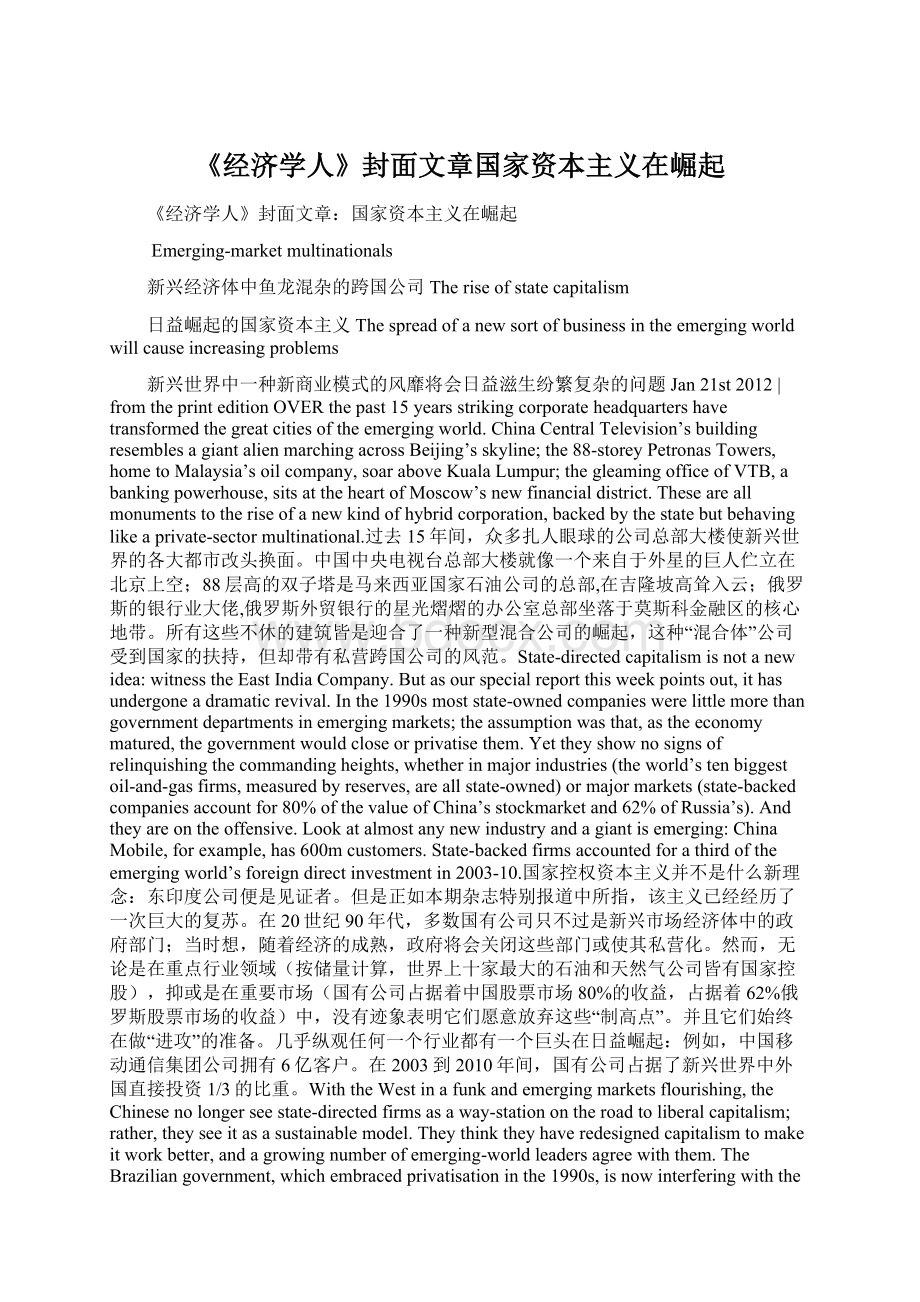《经济学人》封面文章国家资本主义在崛起.docx
《《经济学人》封面文章国家资本主义在崛起.docx》由会员分享,可在线阅读,更多相关《《经济学人》封面文章国家资本主义在崛起.docx(4页珍藏版)》请在冰豆网上搜索。

《经济学人》封面文章国家资本主义在崛起
《经济学人》封面文章:
国家资本主义在崛起
Emerging-marketmultinationals
新兴经济体中鱼龙混杂的跨国公司Theriseofstatecapitalism
日益崛起的国家资本主义Thespreadofanewsortofbusinessintheemergingworldwillcauseincreasingproblems
新兴世界中一种新商业模式的风靡将会日益滋生纷繁复杂的问题Jan21st2012|fromtheprinteditionOVERthepast15yearsstrikingcorporateheadquartershavetransformedthegreatcitiesoftheemergingworld.ChinaCentralTelevision’sbuildingresemblesagiantalienmarchingacrossBeijing’sskyline;the88-storeyPetronasTowers,hometoMalaysia’soilcompany,soaraboveKualaLumpur;thegleamingofficeofVTB,abankingpowerhouse,sitsattheheartofMoscow’snewfinancialdistrict.Theseareallmonumentstotheriseofanewkindofhybridcorporation,backedbythestatebutbehavinglikeaprivate-sectormultinational.过去15年间,众多扎人眼球的公司总部大楼使新兴世界的各大都市改头换面。
中国中央电视台总部大楼就像一个来自于外星的巨人伫立在北京上空;88层高的双子塔是马来西亚国家石油公司的总部,在吉隆坡高耸入云;俄罗斯的银行业大佬,俄罗斯外贸银行的星光熠熠的办公室总部坐落于莫斯科金融区的核心地带。
所有这些不休的建筑皆是迎合了一种新型混合公司的崛起,这种“混合体”公司受到国家的扶持,但却带有私营跨国公司的风范。
State-directedcapitalismisnotanewidea:
witnesstheEastIndiaCompany.Butasourspecialreportthisweekpointsout,ithasundergoneadramaticrevival.Inthe1990smoststate-ownedcompanieswerelittlemorethangovernmentdepartmentsinemergingmarkets;theassumptionwasthat,astheeconomymatured,thegovernmentwouldcloseorprivatisethem.Yettheyshownosignsofrelinquishingthecommandingheights,whetherinmajorindustries(theworld’stenbiggestoil-and-gasfirms,measuredbyreserves,areallstate-owned)ormajormarkets(state-backedcompaniesaccountfor80%ofthevalueofChina’sstockmarketand62%ofRussia’s).Andtheyareontheoffensive.Lookatalmostanynewindustryandagiantisemerging:
ChinaMobile,forexample,has600mcustomers.State-backedfirmsaccountedforathirdoftheemergingworld’sforeigndirectinvestmentin2003-10.国家控权资本主义并不是什么新理念:
东印度公司便是见证者。
但是正如本期杂志特别报道中所指,该主义已经经历了一次巨大的复苏。
在20世纪90年代,多数国有公司只不过是新兴市场经济体中的政府部门;当时想,随着经济的成熟,政府将会关闭这些部门或使其私营化。
然而,无论是在重点行业领域(按储量计算,世界上十家最大的石油和天然气公司皆有国家控股),抑或是在重要市场(国有公司占据着中国股票市场80%的收益,占据着62%俄罗斯股票市场的收益)中,没有迹象表明它们愿意放弃这些“制高点”。
并且它们始终在做“进攻”的准备。
几乎纵观任何一个行业都有一个巨头在日益崛起:
例如,中国移动通信集团公司拥有6亿客户。
在2003到2010年间,国有公司占据了新兴世界中外国直接投资1/3的比重。
WiththeWestinafunkandemergingmarketsflourishing,theChinesenolongerseestate-directedfirmsasaway-stationontheroadtoliberalcapitalism;rather,theyseeitasasustainablemodel.Theythinktheyhaveredesignedcapitalismtomakeitworkbetter,andagrowingnumberofemerging-worldleadersagreewiththem.TheBraziliangovernment,whichembracedprivatisationinthe1990s,isnowinterferingwiththelikesofValeandPetrobras,andcompellingsmallercompaniestomergetoformnationalchampions.SouthAfricaisalsoflirtingwiththemodel.随着西方世界陷入恐慌,新兴市场蓬勃发展,在通往自有资本主义的道路上,中国人不再只会把国有公司当作是一个中转站;而是他们将其视为一种可持续发展的模式。
他们认为,他们已经重新设计了资本主义以便更有效率,并且越来越多的新兴世界领导人同意他们的做法。
巴西政府曾在20世纪90年代支持私营化,但如今正逐渐倾向于支持淡水河谷公司和国家石油公司(的发展模式),并且还迫使小规模公司合并以重新组成国家大型企业。
南非也正在考虑朝这个模式发展。
Thisdevelopmentraisestwoquestions.Howsuccessfulisthemodel?
Andwhatareitsconsequences—bothin,andbeyond,emergingmarkets?
这种发展模式引出了两个问题:
这种模式会如何实现成功?
另外它的影响又是什么——这两个问题在新兴市场内外皆有存在?
Thelawofdiminishingreturns收益日益递减法则Statecapitalism’ssupportersarguethatitcanprovidestabilityaswellasgrowth.Russia’swildprivatisationunderBorisYeltsininthe1990salarmedmanyemergingcountriesandencouragedtheviewthatgovernmentscanmitigatethestrainsthatcapitalismandglobalisationcausebyprovidingnotjustthehardinfrastructureofroadsandbridgesbutalsothesoftinfrastructureofflagshipcorporations.国家资本主义的支持者认为这种模式既能促进经济增长又能促进稳定。
20世纪90年代鲍里斯?
叶利钦掌权下的俄罗斯实行了狂飙突进的私营化,这令许多国家茅塞顿开,并且推广这一做法,即政府不仅可以通过提供道路和桥梁等硬基础设施,而且还可发展像旗舰企业这样的软基础设施来缓解资本主义和全球化所导致的困难局面。
SoLeeKuanYew’sgovernmentinSingapore,anearlyexponentofthisidea,letinforeignfirmsandembracedWesternmanagementideas,butalsoownedchunksofcompanies.TheleadingpractitionerisnowChina.ThetightconnectionbetweenitsgovernmentandbusinesswillnodoubtbeondisplaywhentheglobalelitegathersintheSwissresortofDavosnextweek.AmongWesternersthere,governmentdelegatesoftentaketheoppositeviewtothosefromtheprivatesector:
Chinesedelegatesfrombothsidestendtohavethesamepointofview,andeventhesamepatriotictalking-points.因此,新加坡的李光耀政府早起支持这一模式,允许外国公司进入过门,拥护西方的管理理念,并且还掌控许多巨头公司。
如今,中国是独领风骚的实践者。
在全球精英于下周在瑞士度假胜地达沃斯齐聚一堂之际,毫无疑问,那将会见证政府和商界紧密联系的上演。
从西方人的角度看,政府代表经常与私营领域的观点南辕北辙:
来自于政、商的中国代表倾向于支持同样的观点,甚至谈论同样的爱国话题。
ThenewmodelbearslittleresemblancetothedisastrousspateofnationalisationsinBritainandelsewherehalfacenturyago.China’sinfrastructurecompanieswincontractstheworldover.Thebestnationalchampionsareoutward-looking,acquiringskillsbylistingonforeignexchangesandtakingoverforeigncompanies.Andgovernmentsareselectiveintheircorporateholdings.Overall,theChinesestatehaslooseneditsgripontheeconomy:
itsbureaucratsconcentrateonindustrieswheretheycanmakeadifference.与半个世纪前殃及英国和全球其它国家的一系列国营化运动相比,新模式几乎没什么相似之处。
中国的基础设施公司在全球范围内斩获合同。
主张外向型发展,通过在国外交易所上市以及收购外国公司获取技术的企业是最佳的国有企业龙头。
并且在公司控股上政府是具有选择性的。
纵观全局,中国政府已经放松了对经济的管制:
该国的官僚集中精力关注那些能有所建树的行业。
Letathousandmobilesbloom“百花齐放”Yetacloselookatthemodelshowsitsweaknesses.Whenthegovernmentfavoursonelotofcompanies,theotherssuffer.In2009ChinaMobileandanotherstategiant,ChinaNationalPetroleumCorporation,madeprofitsof$33billion—morethanChina’s500mostprofitableprivatecompaniescombined.Stategiantssoakupcapitalandtalentthatmighthavebeenusedbetterbyprivatecompanies.Studiesshowthatstatecompaniesusecapitallessefficientlythanprivateones,andgrowmoreslowly.Inmanycountriesthecoddledstategiantsarepouringmoneyintofancytowersatatimewhenentrepreneursarestrugglingtoraisecapital.但是仔细打量这种模式便会露出诸多弱点。
若政府支持众多公司中的一家,其它公司便会“受伤”。
在2009年,中国移动通信集团公司和另一家国有企业巨头,中国石油天然气集团公司盈利达330亿美元——高于中国500家最具盈利的私营企业的利润总和。
国有企业巨头吸纳资本和人才,而这两者在私营公司内会更有用武之地。
无数研究表明,与私营企业相比,国有企业利用资本的效率比较低,并且增长还较为缓慢。
在许多国家,许多国有企业巨头把资金投入到光鲜亮丽的高楼建设中,而彼时,私营企业家正在四处奔波,筹集资金。
Thosecostsarelikelytorise.Statecompaniesaregoodatcopyingothers,partlybecausetheycanusethegovernment’sclouttogetholdoftheirtechnology;butastheyhavetoproduceideasoftheirowntheywillbecomelesscompetitive.State-ownedcompaniesmakeafewbigbetsratherthanlotsofsmallones;theworld’sgreatcentresofinnovationareusuallynetworksofsmallstart-ups.这些成本有望增加。
国有企业擅长照搬它人。
某种程度上是因为它们可以利用政府的影响力攫取技术;但是尽管如此,它们必须要有自己的“点子”,否则会越来越没有竞争力。
国有企业下一些大的赌注而非一些小赌注;世界上大型的创意中心通常是由无数小型初创企业组成。
Nordoesthemodelguaranteestability.Statecapitalismworkswellonlywhendirectedbyacompetentstate.ManyAsiancountrieshaveastrongmandarinculture;SouthAfricaandBrazildonot.CoalIndiaishardlyanadvertisementforefficiency.Andeverywherestatecapitalismfavourswell-connectedinsidersoverinnovativeoutsiders.InChinahighlyeducatedprincelingshavetakenthespoils.InRussiaacliqueof“bureaugarchs”,oftenformerKGBofficials,dominateboththeKremlinandbusiness.Thusthemodelproducescronyism,inequalityandeventuallydiscontent—astheMubaraks’brandofstatecapitalismdidinEgypt.这种模式也无法确保稳定。
只有一个强有力的政府领导,国家资本主义才能运转良好。
许多亚洲国家都有很浓重的官僚文化;而南非和巴西则没有。
印度煤炭公司几乎就是效率的广告代表。
并且随处可见的国家资本主义更倾向于支持联系紧密的内部企业而非具有创新思维的局外人。
在中国,受过高等教育的幼君已经攫取了胜利果实。
在俄罗斯,一小股由政界和商界寡头(通常是前苏联安全委员会官员)组成的集团主宰着克里姆林宫和商界。
如此一来,这种模式将会滋生任人唯亲,不公平,直到最后导致民众不满——正如主张实行国家资本主义的埃及代表人物穆巴拉克。
Risingpowershavealwaysusedthestatetokick-startgrowth:
thinkofJapanandSouthKoreainthe1950sorGermanyinthe1870soreventheUnitedStatesafterthewarofindependence.Butthesecountrieshave,overtime,invariablyfoundthatthesystemhaslimits.TheChineseofallpeopleshouldunderstandthatthebestwaytolearnfromhistoryistolookatitslongsweep.刚刚崛起的势力通常利用国家的力量壮大实力:
想想20世纪50年代的日本和韩国,或19世纪70年代的德意志帝国,抑或是甚至独立战争后的美国。
但是这些国家久而久之就发现这个体系是有诸多弊端的。
所有中国人应该深知,学习历史的最佳方式就是纵观某个体系的来龙去脉。
Butitmaytakemanyyearsforthemodel’sweaknessestobecomeobvious;and,inthemeantime,itislikelytocauseallsortsofproblems.Investorsinemergingmarkets,forinstance,needtowatchout.Somemaybetakingapuntongovernmentsasmuchascompanies.State-capitalistgovernmentscanbecapricious,withscantregardforminorityshareholders.Othersmayfindtheirsubsidiariesorjointventuresinemergingmarketspittedagainststate-backedfavourites.但是若要使该模式的缺点一目了然需花数年时间;并且在这期间,很可能会导致所有类型问题的出现。
例如,新兴市场中的投资者需要密切关注。
某些投资者就像对其它公司一样正在打许多政府的主意。
国家资本主义政府可以是反复无常,三心两意,很少考虑少数股东。
其它政府或会发现,它们在新兴市场中的子公司或合资企业与那些国家扶持的公司会相竞争。
Anotherconcernistheimpactofthemodelontheglobaltradingsystem—which,atatimewhenthelikelyRepublicannomineeforpresidentwantstodeclareChinaacurrencymanipulatoronhisfirstdayofoffice,isalreadyatrisk.Ensuringthattradeisfairisharderwhensomecompaniesenjoythesupport,overtorcovert,ofanationalgovernment.Westernpoliticiansarebeginningtolosepatiencewithstate-capitalistpowersthatrigthesysteminfavouroftheirowncompanies.另外一个担忧就是这种模式对全球交易系统的影响——每次,可能当选美国总统的共和党提名候选人在其上任的第一天就意欲宣布中国是汇率操纵国——其实风险已经产生了。
当某些公司享受一国政府公开或隐蔽的支持时,要确保公平的交易更是难上加难。
西方政客正逐渐开始对国家资本主义权力失去耐心,这种权利操纵系统体系以支持本国公司。
Foremergingcountrieswantingtomaketheirmarkontheworld,statecapitalismhasanobviousappeal.Itgivesthemthecloutthatprivate-sectorcompanieswouldtakeyearstobuild.Butitsdangersoutweighitsadvantages.Bothfortheirownsake,andintheinterestsofworldtrade,thepractitionersofstatecapitalismneedtostartunwindingtheirhugeholdingsinfavouredcompaniesandhandingthemovertoprivateinvestors.Ifthesecompaniesareasgoodastheyboasttheyare,thentheynolongerneedthecrutchofstatesupport.对于觊觎在世界舞台留有印迹的新兴国家而言,国家资本主义有着显而易见的诱惑。
这种模式(指国家资本主义)赐予它们私营领域公司需用数年才能打造的影响力。
但是其弊远远